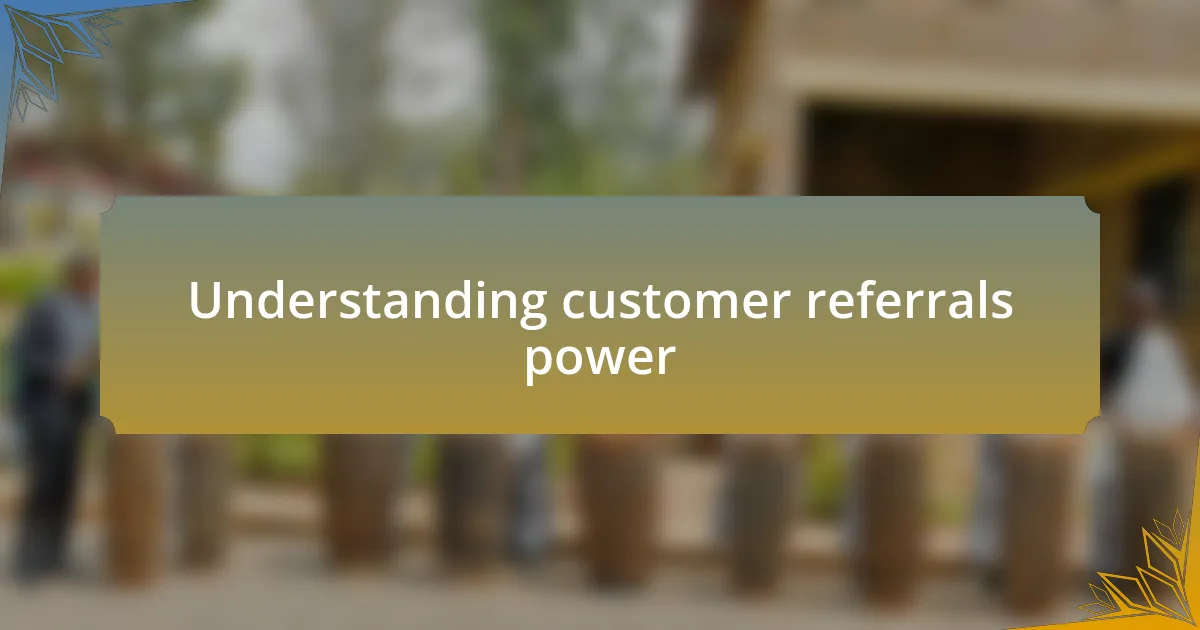Key takeaways:
- Referrals create strong emotional connections and trust, leading to increased customer loyalty and satisfaction.
- Effective referral programs should be simple and incentivize customers, transforming them into brand ambassadors.
- Building a referral culture within an organization involves recognizing and celebrating contributions that drive word-of-mouth marketing.
- Personal experiences and timely recommendations are crucial for successful referrals, highlighting the need for understanding individual preferences.

Understanding customer referrals power
Referrals hold incredible power because they resonate on a level that traditional marketing often can’t achieve. I recall a time when I personally recommended a local restaurant to a friend, and the excitement in their voice when they enjoyed the meal mirrored my own initial experience. It made me realize how much weight a personal endorsement carries—people trust their friends and family more than they trust a brand.
Think about it: when was the last time you tried a new service based on a friend’s suggestion? Often, referrals come with a built-in level of credibility. I remember reading a study that stated that referred customers are 18% more likely to stay loyal to a brand. That statistic really struck me, as it highlights the emotional connection that stems from trust. It’s not just about making a sale; it’s about creating a lasting relationship.
Moreover, the emotional joy of sharing a great experience is a powerful driver. I’ve seen firsthand how glowing recommendations can spark interest and excitement in others. Have you ever felt the rush of connecting someone with an amazing product or service? That moment of shared discovery is what deepens customer relationships and fosters community, showcasing the true potential of referrals in enhancing the customer experience.

Importance of referrals in business
Referrals are undeniably crucial for a business, as they often lead to high-quality leads. I remember a time when I was in need of a reliable plumber; a friend recommended someone they trusted. Not only was I more inclined to reach out, but my experience with that plumber ended up being fantastic, reinforcing my friend’s recommendation. That level of trust translated to a swift and successful transaction, demonstrating how referrals can shortcut the decision-making process.
One of the most compelling reasons to prioritize referrals is their cost-effectiveness. I’ve seen businesses flourish simply by cultivating relationships with satisfied customers, who then become brand ambassadors. This organic method of generating new customers can significantly reduce marketing expenses while maximizing results. When you think about it, wouldn’t you rather invest in nurturing relationships than pouring money into ads that may or may not reach your target audience?
Additionally, referrals contribute to a positive cycle of trust and satisfaction. Have you ever wondered why some brands seem to have a loyal following? It’s often because those brands prioritize the voice of their customers, encouraging them to share their stories. I’ve found that organizations that embrace and celebrate referrals not only boost their reputation but also enhance customer loyalty and retention. Each successful referral adds to the community feeling, fostering an environment where customers feel valued and engaged.

Enhancing customer experience through referrals
There’s something unique about the referral process that really enhances the customer experience. I remember when I was looking for a new gym; I reached out to friends for their recommendations. The moment they shared their positive experiences, it made me feel like I was stepping into a community rather than just a fitness center. This sense of belonging not only motivated me to join but also made my transition smoother, illustrating how referrals create a welcoming environment for new customers.
Moreover, referrals have the power to cultivate deeper emotional connections between businesses and their customers. I once used a service recommended by a neighbor, and the level of care I received was astounding. The staff seemed genuinely invested in my satisfaction, almost as if they were part of my neighborhood too. It struck me that when a business is recommended, it often carries an unspoken commitment to uphold the same high standards. This connection instills confidence and transforms mundane transactions into meaningful experiences.
Also, think about how powerful it is to feel validated by the choices others make. When I choose a restaurant that my friends rave about, I already go in with a positive mindset. This anticipation not only enhances my dining experience but also builds a shared excitement with those who referred me. It’s a fascinating cycle: referrals set the tone for excellence and often exceed expectations, highlighting how significant they are in shaping memorable customer journeys.

Strategies for effective referral programs
Creating an effective referral program starts with incentivizing your current customers. I once joined a loyalty program that offered discounts for every referral I brought in. It made me feel valued, and suddenly, I was not just a customer; I became a brand ambassador. Have you ever felt that charge of excitement when you’re rewarded for sharing a service you love? It’s a powerful motivator that can drive engagement and enthusiasm among your network.
Next, simplicity is key. Referral programs should be straightforward to understand and participate in to prevent any frustration. I remember trying to refer friends to a complicated system that required too many steps, and I quickly lost interest. Think about your own experiences—haven’t you ever been deterred by overly complex processes? Streamlined programs can enhance the user experience, making it easier for satisfied customers to share their great encounters.
Finally, highlighting the positive social proof of existing referrals can significantly boost conversion rates. Think about the last time you saw a friend rave about a product on social media. It instantly encouraged me to check it out. By showcasing testimonials and success stories within your referral program, you’re creating a sense of trust and community. Have you noticed how those stories can resonate deeply? They remind us, as customers, why we chose that brand in the first place and compel us to share that confidence with others.

Personal experiences with referral successes
I once had an incredible experience with a referral program that brought me both joy and a sense of accomplishment. After recommending a local gym to a friend, not only did we both receive free membership months, but it also cultivated a strong bond between us. Have you ever found that sharing something you love with a friend not only benefits both parties but also creates a shared experience?
In another situation, I referred a favorite online retailer to a family member, and the excitement I felt when they made their first purchase was infectious. The retailer had this fantastic program where I received bonus points for each referral. It was thrilling to watch my points accumulate, reminding me how our personal networks can amplify success. Does it surprise you how a simple referral can transform a casual interaction into a win-win for everyone involved?
Reflecting on these experiences, I see how referrals can act as a bridge, connecting people to opportunities and enhancing their experiences with a brand. I remember receiving a heartfelt thank-you from the gym for referring my friend; it wasn’t just about the rewards but the gratitude that made me feel part of their community. How often do we miss out on those connections because we underestimate the power of sharing?

Lessons learned from referral challenges
Navigating referral challenges can often be a learning experience. I recall trying to introduce a colleague to a software solution that had been incredibly beneficial for my own productivity. However, when my colleague didn’t find it as intuitive as I did, it highlighted the importance of understanding individual preferences and needs in referrals. Have you ever faced a similar situation where your enthusiasm didn’t quite match someone else’s experience?
In another instance, I attempted to recommend a service that my family had relied on for years, only to discover that they had recently changed their pricing structure. This moment was a wake-up call, emphasizing that even the most trusted services can evolve. It made me realize how vital it is to stay updated and communicate changes clearly when making referrals. How often do we overlook this crucial aspect in our eagerness to help others?
Lastly, I learned that timing is everything. I once referred a product to a friend during a particularly busy season in their life, and it ended up feeling more like a burden than a helpful suggestion. This taught me the significance of choosing the right moment for referrals, ensuring they are truly beneficial. Have you ever experienced a referral that came at just the right time—or perhaps at the wrong time?

Building a referral-focused culture
Creating a referral-focused culture requires more than just asking for referrals; it’s about embedding the practice into the organization’s DNA. I remember working at a startup that thrived on word-of-mouth. Each week, we celebrated team members who contributed to this culture by sharing their success stories. Reflecting on those moments, I realized how uplifting it can be to acknowledge efforts that drive referrals, fostering a sense of community and shared purpose.
It’s fascinating how simple practices can have profound impacts. During my time in customer service, I encouraged my team to proactively ask for feedback after each interaction. We discovered that customers who felt valued were more inclined to share their positive experiences. Have you considered how vital it is to engage with your customers regularly, creating an environment where they feel empowered to refer?
Moreover, leadership plays a crucial role in nurturing this culture. At one point, I witnessed a manager who personally reached out to customers to thank them for referrals. This gesture not only strengthened relationships but also inspired others to do the same. It makes me wonder: how can we ensure that every employee understands the significance of their contributions to this referral culture?